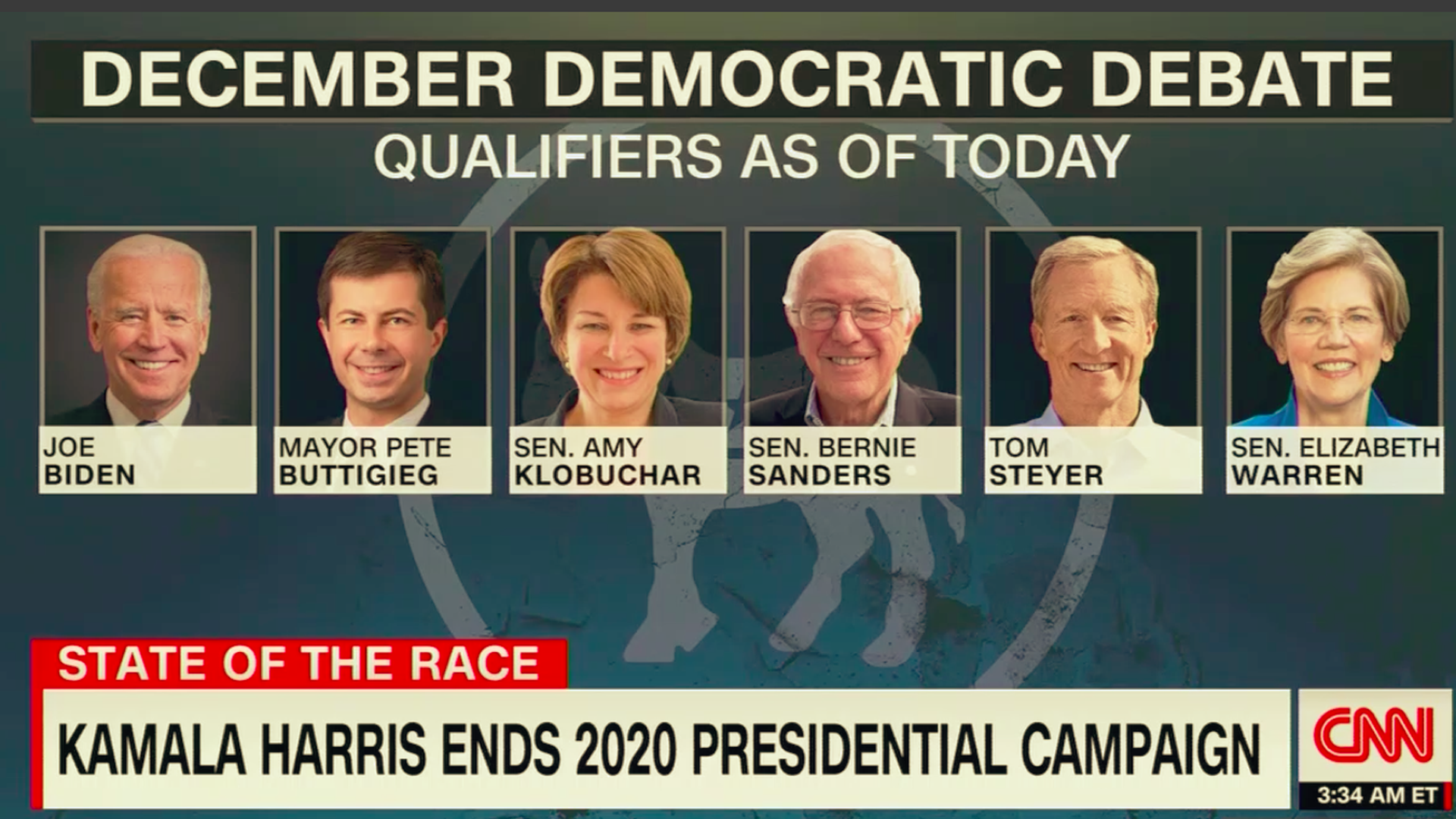| |
| |
| |
| Presented By Morgan Stanley |
| |
| Axios AM |
| By Mike Allen ·Dec 04, 2019 |
| 🥣You're invited! D.C. readers ... Please join me tomorrow at 8 a.m. for breakfast conversations on hometown issues, from affordable housing to small business growth. 🎉 Mazel tov to Axios' Alexi McCammond and Sara Fischer on being named to Forbes' 2020 30 Under 30 Media list. |
| |
| |
| 1 big thing: Steep odds against Warren's big ideas |
 |
|
| Photo illustration: Aïda Amer/Axios. Photo via Sean Rayford/Getty Images |
| |
| Sen. Elizabeth Warren is suddenly having a harder time selling her big ideas in the Democratic primary. As president, she'd have an even tougher time convincing Congress — even if Democrats held both chambers, David Nather and Alexi McCammond write. - Why it matters: Warren wouldn't have solid Dem support for her biggest ideas, including the wealth tax, Medicare for All and the Green New Deal.
Warren could take some significant things through executive action — including tougher antitrust enforcement to try to break up the Big Tech companies. - But she'd need Congress for her plans on health care, banking, taxes, student loans and other issues.
Her college debt plan would likely get a major rewrite from fellow Democrats: - They're unlikely to go along with a full repeal of the GOP tax cut to set the stage for her corporate profits tax, according to Senate Democratic aides.
- Warren's answer to that problem is to eliminate the filibuster so Democrats can pass legislation with a simple majority. But she'd have a hard time doing that since some Democrats, like Kyrsten Sinema, say they'd never support it.
What Warren could do on her own: - She could appoint an aggressive Financial Stability Oversight Council to provide much tougher oversight of America's biggest banks.
- On insulin, EpiPens, and the anti-inflammatory drug Humira, Warren says she'd be able to reduce the price of some costly drugs and delivery devices through executive actions.
- Warren could effectively decriminalize border crossings, not by changing the law but through instructions from the Justice Department telling federal prosecutors not to prosecute those crimes, Axios' Stef Kight reports.
The Warren campaign insists she could pass one of her most popular ideas — the wealth tax — through a budget reconciliation process that requires a simple majority vote in the Senate, and that she could use executive action to implement significant changes on health care, gun control and the environment. |
    |
| |
| |
| 2. Warren's top 10 |
 |
|
| Photo illustration: Aïda Amer/Axios. Photo via Joseph Prezioso/Getty Images |
| |
| Here's a look at the odds for 10 of Elizabeth Warren's most ambitious plans, according to Democratic aides, former White House policy officials from both parties, and Axios' issue experts: - Wealth tax: Warren's idea of a 2% annual tax on household net worth of $50 million and over — with an additional 4% annual tax on amounts above $1 billion — would have a hard time passing in this form even among Democrats, largely because of the practical problems in implementing it.
- Medicare for All: Democrats couldn't even pass a public option — now considered the moderate alternative to Medicare for All — as part of the Affordable Care Act in 2009, when they had 60 votes in the Senate.
- College debt (eliminate $640 billion in student debt, establish free public college): Democrats broadly agree on the goal of making college more affordable, but they're likely to debate the cost and whether any proposal should be targeted toward low-income people.
- Breaking up Big Tech: "In the end, it's the courts that decide if there's an antitrust violation and what the appropriate remedy is," said Gene Kimmelman, a former DOJ antitrust official who's now a senior adviser at Public Knowledge, a nonprofit that focuses on tech issues.
- Green New Deal: The sweeping plan — which includes federal guarantees for health care, housing and jobs on top of aggressive climate change and clean energy goals — would almost certainly fail in the next Congress, given how many moderate Democrats have been skeptical of it.
- Corporate tax (7% tax on companies' profits over $100 million): This one's tougher to call given that Senate Democrats just aren't talking about it.
- Banks (21st Century Glass-Steagall Act to separate commercial banks from investment banks): Warren would need legislation to carry that out, Axios' Felix Salmon reports — but she could appoint aggressive members of the Financial Stability Oversight Council, an entity created by the Dodd-Frank banking overhaul.
- Private equity: Ideas like making buyout funds liable for leveraged financing aren't about to get through Congress.
- Decriminalize immigration violations: A Warren Justice Department could just issue instructions not to prosecute border crossings.
- Fracking ban: A ban on the controversial oil and gas extraction on private and state lands would need approval from Congress.
Share this story. |
    |
| |
| |
| 3. Impeachment update |
| Photo Illustration by Chip Somodevilla/Getty Images In a prelude to articles of impeachment, House Democrats conclude in a 300-page report that President Trump abused the power of his office to pressure Ukraine to announce investigations beneficial to his re-election campaign. Topline conclusions, per Alayna Treene: - Democrats say Trump "sought to undermine the integrity of the U.S. presidential election process, and endangered U.S. national security."
- They argue that Trump's "closest subordinates and advisers," including acting Chief of Staff Mick Mulvaney, Secretary of State Mike Pompeo, Secretary of Energy Rick Perry and others, had direct knowledge of the "scheme."
- Democrats say Trump "ordered and implemented a campaign to conceal his conduct from the public" and obstruct the congressional impeachment inquiry, including blocking those subordinates and advisers from testifying.
Read the report. How it's playing: |
    |
| |
| |
| A message from Morgan Stanley |
| Transitioning LIBOR: What it means for investors |
| |
|
| |
| LIBOR is the world's most widely used benchmark for short-term rates, but its era of influence is slated to end by 2022. A look at the implications for asset classes and investors. |
| |
| |
| 4. Prop war |
| House Intelligence Chairman Adam Schiff (D-Calif.): Photo: Chip Somodevilla/Getty Images ... and House Minority Leader Kevin McCarthy (R-Calif.): Photo: Alex Wong/Getty Images |
    |
| |
| |
| 5. At Google, twilight of the founders |
| Sergey Brin and Larry Page in 2002. Photo: Richard Koci Hernandez/The Mercury News via Getty Images Google's founders, Larry Page and Sergey Brin — each age 46 — announced yesterday that they're retaining their board seats but handing operational responsibility for both Alphabet and Google over to Google CEO Sundar Pichai. - Why it matters, from Axios managing editor Scott Rosenberg in S.F.: The move marks a transition in which big tech is passing from the control of founders to the stewardship of successor technocrats.
- Apple's Steve Jobs died a decade ago. Bill Gates is long retired from Microsoft. Of the five dominant tech firms, only Amazon and Facebook remain under the direction of their founders.
|
    |
| |
| |
| 6. Gossiping leaders |
 |
|
| Canadian Prime MInister Justin Trudeau. Photo: Host Broadcaster via AP |
| |
| Several NATO leaders seem to have been caught gossiping about President Trump on a hot mic, AP reports. - During a reception at Buckingham Palace, Prime Minister Boris Johnson asked French President Emmanuel Macron: "Is that why you were late?"
- Canadian Prime Minister Justin TrudeauTrudeau said: "He was late because he takes a 40-minute press conference off the top." That appeared to refer to a long, unscheduled Q&A by Trump, who wasn't mentioned by name.
📱Footage was posted online by Canada's CBC and has been viewed more than 5 million times. |
    |
| |
| |
| 7. Chaos, cash crunch KO Kamala |
| Photo: Elijah Nouvelage/Reuters Above, Sen. Kamala Harris (D-Calif.) launches her campaign for president in her hometown of Oakland, Calif., in January. - "The freshman senator entered the race as a rising star, representing the more youthful and diverse voters that have become the Democratic Party's base. Her sharp interrogations of Trump administration officials in Senate hearings had made her one of the highest-profile members of Congress." —L.A. Times
Below, her Oakland campaign office yesterday after she became the first top-tier candidate to drop out. - Harris "proved an uneven campaigner and was ultimately engulfed by low polling numbers, internal turmoil and a sense that she was unable to provide a clear message amid the roiling, impassioned politics of the moment." —WashPost's Chelsea Janes
Photo: Justin Sullivan/Getty Images |
    |
| |
| |
| 8. Dems' diversity gap |
 |
|
| Screenshot: CNN |
| |
| Leading Democrats, including presidential candidates Sen. Cory Booker (D-N.J.) and former HUD Secretary Julián Castro, spoke out against an increasing lack of diversity in the race after Sen. Kamala Harris' exit, Axios' Rebecca Falconer writes. - Why it matters: The six candidates who've qualified for the upcoming debate are all white.
|
    |
| |
| |
| 9. Tweet du jour |
| |
    |
| |
| |
| 10. 1 song thing |
| This memorial plaque stands between Great American Ball Park and Heritage Bank Center in Cincinnati. Photo: John Minchillo/AP The Who announced last night it will play its first Cincinnati area concert since 11 fans died 40 years ago in a pre-show stampede. - The Rock & Roll Hall of Fame band will play April 23 at Northern Kentucky University's BB&T Arena, across the Ohio River and seven miles south of the Dec. 3, 1979, concert, per AP.
"We need to go back to Cincinnati," Pete Townshend said on a documentary aired in Cincinnati last night. "It would be such a joyous occasion for us, and such a healing thing." |
    |
| |
| |
| A message from Morgan Stanley |
| Navigating credit markets in 60 seconds |
| |
|
| |
| There can be opportunity on the higher end of the capital structure. Hear more about navigating credit markets from Vishy Tirupattur, Morgan Stanley's Head of U.S. Fixed Income Research. |
| |
| 📬Thanks for reading! Please tell a friend about AM/PM. |
Comments
Post a Comment